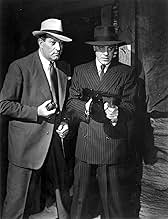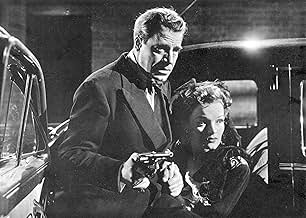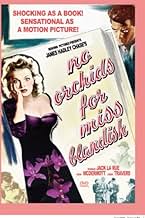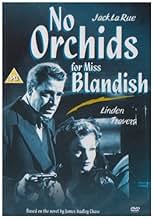John Blandish is worth $100 million. His heiress daughter is soon to be wed to Foster Harvey, who believes she's a cold, unfeeling woman, despite loving her. Her cold emotional state is in l... Read allJohn Blandish is worth $100 million. His heiress daughter is soon to be wed to Foster Harvey, who believes she's a cold, unfeeling woman, despite loving her. Her cold emotional state is in large part due to leading a restricted life. A low level thug named Johnny overhears their ... Read allJohn Blandish is worth $100 million. His heiress daughter is soon to be wed to Foster Harvey, who believes she's a cold, unfeeling woman, despite loving her. Her cold emotional state is in large part due to leading a restricted life. A low level thug named Johnny overhears their secret wedding night plans, and peddles the idea of robbing her of the $100,000 worth of d... Read all
- Director
- Writers
- Stars
- Doc
- (as Macdonald Parke)
- Ma Grisson
- (as Lilly Molnar)
- Riley
- (as Richard Nelson)
- Director
- Writers
- All cast & crew
- Production, box office & more at IMDbPro
Featured reviews
Linden Travers looks lovely in the title role. This actress was, generally associated with a different sort of film. She's beautiful and elegant. But she gives this part her all.
"No Orchids For Miss Blandish" is a British movie trying to seem an American. For us today, that's very much a reversal: How often do American movies try to put on the dog and portray the British! Unfortunately, the movie at hand doesn't really succeed. We don't believe it's taking place in the US. Even though we're shocked at the nonstop violence, we don't believe the story fully, either.
Jack La Rue is good in the male lead. He was American. He is convincing.
I wish I could say I recommend this as more than a curiosity. Ms. Travers is indeed superb. But it isn't terribly good. Not bad but, apart from the exceptional violence, nothing special either.
Then, midway through the film, action stops as the picture changes from an action melodrama to a romancer, and the fast pace comes to a halt. I did not notice much chemistry between the principals, Jack LaRue (in a Bogart role) and Linden Travers (in a role somewhere between Ingrid Bergman and Claire Trevor), although she got the better of him in the acting department. Larue, for his part, has a great baleful stare, which comprises most of his acting technique. Speaking of acting, it was very uneven among the rest of the cast, however there were American equivalents of Sidney Greenstreet, Leo Gorcey, Mike Mazurki and Dan Duryea.
Did I mention this was a fascinating picture? Well, it certainly is and if it comes on, don't miss it. It is like a Monogram Studio feature but with major studio production values. Lovely background music by George Melachrino helps, but he wrote a couple of clinkers as night club numbers which are forgettable. In short, it is very worth seeing so you can compare American and UK gangster movies.
P.S. When was the last time you saw a hit-man wearing a bow-tie?
In this terse screenplay they need little prodding to slug someone with a fist or a gun while the plan is to kidnap and rob a wealthy socialite who turns out to have a yen for the lead criminal (AL LA RUE). He has a role crying out for an American actor like Bogart or Garfield if this were a Warner melodrama. La Rue does alright but he's about as wooden as George Raft when it comes to delivering key lines with any enthusiasm.
LINDEN TRAVERS is the pretty socialite captured by a bunch of thugs and falling quickly into the Patty Hearst syndrome when she becomes a willing victim willing to escape the sheer boredom of her life as a pampered daughter of a wealthy aristocrat.
HUGH McDERMOTT is the detective set on her trail by her father who only wants to free her from captivity. It all feels like a Mickey Spillane thriller with little sympathy for any of the victims who get shot for the slightest infringement at a moment's notice.
The nightclub scenes seem to have been inspired by GILDA ('46), with a songstress rendering a non-too-subtle rendition of a torch song in a flimsy peekaboo dress while around her all sorts of plotting and planning is going on somewhere in the dark.
Not bad, but don't expect the dialog to have the sharp touch intended. "Drop your anchor in that chair," is about the best you can expect between all the slapping and punching and gunshots that abound in every other scene. The gangster slang gets a workout and some of the jargon is downright hilarious.
Having been impressed with the Aldrich version and being something of a sucker for bad cinema (especially from this vintage), I acquired the film immediately when the opportunity presented itself though I only got to watch BLANDISH now as part of my ongoing Noir marathon. As often happens, the movie is nowhere near the stinker most claim it to be: granted, the performances are hilariously over-the-top (thus a fount of entertainment in itself!), the would-be American accents do not fool anyone (there is even future "Carry On" stalwart Sidney James, for cryin' out loud, not to mention a stand-up comic amusingly spoofing the Hollywood double-act of Sydney Greenstreet and Peter Lorre!) and, frankly, the gall of it all makes the experience that much more fascinating, almost hypnotic!
In comparison with the later version (but typical of its era), the leads here are over-age: they are Jack LaRue (the only genuine Yank in the cast: incidentally, he is far removed from the Mama's Boy as played by Scott Wilson in the remake) and Linden Travers (previously noted for supporting parts in spy thrillers like Hitchcock's superb THE LADY VANISHES [1938], she is the personification of elegance rather than Kim Darby's society brat). Incidentally, both novel and film(s) were criticized for glorifying violence (this is indeed quite brutal for the time) and the notion of 'Amour Fou' since the kidnapped heiress ends up falling for her psychotic captor. Other notable characters are the obese Mob-leading mother (Lilly Molnar), a no-less unhinged member of the gang who becomes involved with the girl who ultimately gives them away (Walter Crisham 'standing in' for Tony Musante), a thuggish cohort (played by Danny Green, later of THE LADYKILLERS [1955]), and a crusading reporter (a much-younger Hugh McDermott 'replacing' Robert Lansing).
The photography (by Gerald Gibbs) is reasonably atmospheric, smoothing over the general amateurishness on display, and there is another definite asset in its lush score. However, one major difference from the obviously superior remake is the film's surprisingly downbeat ending. For the record, I recently acquired another rare Hadley Chase adaptation, the French-made FLESH OF THE ORCHID (1975) – co-scripted by Luis Bunuel regular Jean-Claude Carriere!
Did you know
- TriviaThe film caused huge controversy in the UK after it was passed with an uncut "A" rating on account of the violence and rape implied in the story, leading to critic Dilys Powell stating that the film be "branded with a 'D' certificate for disgusting". This led to various councils banning the film completely and politicians demanding an investigation into the running of the BBFC. Censor Sir Sidney Harris was forced to issue an apology for having "failed to protect the public".
- Quotes
Eddie Schultz: I never count my chickens till I've wrung their necks.
- ConnectionsFeatured in Empire of the Censors (1995)
- How long is No Orchids for Miss Blandish?Powered by Alexa
Details
- Runtime
- 1h 42m(102 min)
- Color
- Aspect ratio
- 1.33 : 1



























